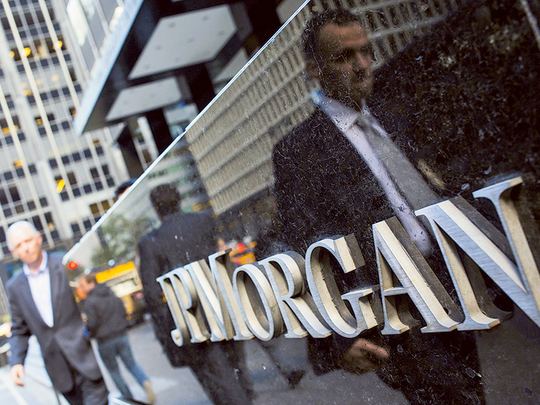
New York: Two of the biggest US banks are gaining confidence that the pandemic won’t send the economy into a calamitous slide anytime soon.
JPMorgan Chase & Co. and Citigroup Inc. set aside just $2.87 billion for loan losses in the third quarter, less than half what analysts expected and even lower than the charge-offs they had this period. The lenders said they’ve been encouraged as consumers have been quick to pay down their credit-card bills and corporate borrowers have repaid the revolving credit lines they tapped at the start of the lockdowns.
The biggest banks were aggressive in beefing up their reserves in the first half, saying they wanted to be covered with so much uncertainty. Executives are still cautioning that the economy is in for a long grind, but their actions indicate that some of the worst outcomes are now less likely for now even with the pandemic dragging on and lawmakers failing to agree on another round of fiscal stimulus.
JPMorgan expects to see material losses in its consumer portfolio starting in the second half of next year, later than initially anticipated.
“Our base case has improved a bit, but uncertainty is still high, 20 million are still unemployed,” JPMorgan Chief Financial Officer Jennifer Piepszak said. “We don’t think we’ll see real material losses emerge until the second half of next year because the consumer is in good shape.”
The smaller provisions helped JPMorgan and Citigroup notch better-than-expected earnings in the third quarter. Still, shares in both companies fell as investors worried that the quarter signaled a pause in pain from soured loans, rather than the end of the line.
Slower Recovery
Following the sharpest economic contraction in records dating back to the 1940s, the U.S. economy rebounded rapidly in the third quarter as businesses reopened and millions of Americans headed back to work. But the economy has now settled into a more moderate pace of improvement.
The U.S. economy is expected to have expanded at an annualized pace of 29.9% in the July-to-September period but grow at just a 4% pace in the fourth quarter, according to estimates of economists in a Bloomberg survey. The International Monetary Fund on Tuesday estimated a shallower U.S. recession in 2020 than in its prior forecast, but lowered its growth projection for 2021.
While both banks expect the U.S. to end 2020 with a lower unemployment rate than they forecast three months ago, Citigroup expects a slower economic recovery over the next two years.
Citigroup shares dropped 4% at 10:41 a.m. in New York trading, while JPMorgan fell 1.4%.
“The longer we go without some type of vaccine that’s been tried and tested and proven, the greater the need for additional stimulus,” Citigroup Chief Financial Officer Mark Mason told journalists on a conference call. “To the extent that we don’t, obviously we’ll start to see many of those pressures as it relates to delinquencies and losses play through at a more rapid pace.”
Still, the banks are currently seeing credit metrics hold up well. Net charge-offs inside JPMorgan’s consumer and community banking unit dropped 13% to $1.09 billion in the quarter, led by a decline in write-offs for its card business. At Citigroup, the percentage of loans that are 90 days past due in its North American consumer business dropped to its lowest level since at least 2018.
The biggest U.S. banks had been lending to a narrower slice of consumers even in the years before the current crisis, and they’ve been cautious in deploying the flood of deposits coming their way in recent months. Cash, Treasuries and other securities effectively guaranteed by the federal government now make up more than 35% of the combined balance sheets of the 25 biggest U.S. banks, the biggest share in Federal Reserve records going back to 1985.
JPMorgan Chief Executive Officer Jamie Dimon said his firm’s $34 billion reserve could be as much as $10 billion too high if the economy continues to steadily recover, though the bank could need to add $20 billion more if an “adverse” economic scenario transpires.








